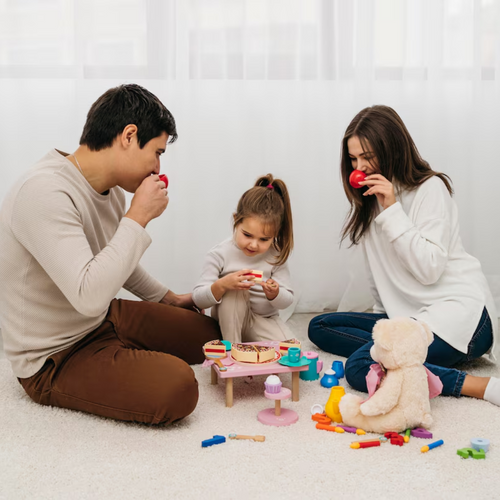
Taking Care of Toddlers: A Guide for Parents
Caring for toddlers can be an incredibly rewarding yet challenging experience. As children transition from infancy to early childhood, their needs and behaviors evolve rapidly. From physical development to social and emotional growth, toddlers require a lot of attention, patience, and understanding.
Neubaby's toddler guide offers practical tips on how to provide the best care for your toddlers during their formative years.
Understanding Toddler Development

Toddlers, generally defined as children between the ages of 1 and 3, go through significant physical, cognitive, and emotional development. During this time, they start to explore the world around them, develop language skills, and assert their independence.
-
Physical Development: Toddlers are becoming more mobile and coordinated. They may be walking, running, climbing, and exploring their environment with newfound energy. It's important to ensure their environment is safe and conducive to this active exploration.
-
Cognitive Development: As toddlers begin to understand cause and effect, they start to grasp basic concepts like colors, shapes, and numbers. They also begin to imitate actions, which plays a key role in their learning.
-
Emotional and Social Development: Toddlers are developing a sense of self and may start exhibiting behaviors like temper tantrums, seeking attention, or displaying affection. Their emotional regulation is still maturing, and they are learning how to interact with others
Toddler Care

-
Nutrition Nutrition plays a crucial role in a toddler’s growth and development. At this stage, children should be eating a variety of foods that provide essential vitamins and nutrients.
- Balanced Diet: Offer a variety of fruits, vegetables, whole grains, and protein-rich foods like lean meats, beans, and eggs.
- Healthy Snacks: Choose healthy snacks like yogurt, cheese, fruit, and whole-grain crackers to keep energy levels stable throughout the day.
- Meal Structure: Toddlers generally eat three meals a day with two snacks in between. Aim for a routine, but don’t worry if they sometimes eat less than expected. Their appetites can fluctuate.
-
Sleep Toddlers need a lot of sleep—usually between 11 and 14 hours a day, including one or two naps. Consistent sleep routines help toddlers feel secure and rested.

-
- Create a Bedtime Routine: Establishing a calming bedtime routine can help toddlers wind down. This might include a bath, reading a story, or singing a lullaby. A predictable routine fosters a sense of security.
- Sleep Environment: Make sure the sleep environment is safe and comfortable. Keep the room cool and dark, and avoid screens before bed as they can interfere with sleep quality.
-
Safety Safety is paramount during the toddler years. Their curiosity knows no bounds, and they may not yet have a full understanding of danger.
- Childproof Your Home: Use safety gates, outlet covers, and cabinet locks to prevent accidents. Ensure that sharp objects, choking hazards, and toxic substances are out of reach.
- Supervision: Always supervise toddlers closely, especially around water, on stairs, or when they are engaging in play that could result in injury.
- Car Safety: Use an age-appropriate car seat whenever traveling in a vehicle, ensuring it is properly installed and the toddler is securely strapped in.
-
Discipline and Behavior Toddlers are testing boundaries as they learn about the world and themselves. While this is a normal part of development, it can be challenging.

- Set Clear Boundaries: Toddlers thrive on routine and knowing what is expected of them. Use simple, clear language to explain rules.
- Consistency: Be consistent with rules and consequences. If a rule is broken, respond with the same level of firmness each time.
- Redirecting Behavior: Instead of punishing unwanted behavior, try redirecting their attention to something more appropriate. For example, if they are throwing toys, gently show them how to use the toy in the correct way.
- Time-Outs: Short time-outs can be effective for helping toddlers understand the consequences of their actions, but be sure to follow the time-out with a discussion about the behavior.
-
Language and Communication Language development is a major milestone during the toddler years. Most toddlers will start to speak their first words and gradually begin forming simple sentences.
- Talk to Your Toddler: Engage in frequent conversations with your toddler, even if they can’t respond fully. Explain things to them as you go about your daily activities, helping to build their vocabulary.
- Read Together: Reading is one of the most important activities for language development. Encourage a love of books by reading with your toddler every day.
- Listen to Them: Even if their language skills are still developing, listen carefully when your toddler is trying to communicate. This encourages them to continue practicing language.
-
Play and Exploration Play is the primary way toddlers learn. It supports their cognitive, emotional, and physical development, and it helps them to develop important social skills.
- Offer a Variety of Toys: Provide toys that stimulate creativity and imagination, like building blocks, pretend play sets, and art supplies. Simple toys allow toddlers to use their imagination and develop problem-solving skills.
- Outdoor Play: Physical activity is essential for toddlers. Let them run, climb, and explore outdoors to develop coordination and strength.
- Engage in Play Together: While independent play is important, toddlers also benefit from interactive play with adults and other children. Play alongside them to model social behavior and engage in learning activities.
-
Socializing and Emotional Support Toddlers begin to form attachments to caregivers and start to engage with peers in social settings. Supporting their emotional development and encouraging positive interactions is crucial.
- Provide Emotional Support: Toddlers may experience separation anxiety or become upset when faced with new experiences. Offer comfort, empathy, and reassurance when they are feeling unsure or scared.
- Teach Social Skills: While toddlers are still learning how to share and cooperate, you can model positive behaviors like saying “please” and “thank you,” taking turns, and expressing feelings with words.
-
Health and Wellness Regular medical check-ups are important to track your toddler’s growth and address any concerns.
- Vaccinations: Keep up-to-date with vaccinations to protect your child from preventable diseases.
- Monitor Development: If you notice any delays in language, motor skills, or social behavior, speak to your pediatrician for advice.
- Hand Hygiene: Encourage your toddler to wash their hands frequently, especially before meals and after using the bathroom.
Taking care of a toddler is a dynamic and multifaceted job that requires love, patience, and consistency. Remember that every child is different, and it’s normal to face challenges along the way. Stay flexible and seek guidance when needed, and cherish the small, everyday moments that make this stage so special.



